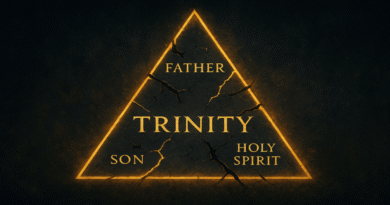Light, Wisdom, and the Choice of Darkness
“You cannot wake someone who is pretending to be asleep.”
The old adage captures a distinction worth examining: between ordinary ignorance and willful ignorance. The first is innocent—a gap in understanding that instruction can fill. The second is something different, a deliberate turning away from what could be known, a refusal to see what has already been made visible. Scripture recognizes this difference and does not treat the latter as a neutral condition.
Whoever loves correction loves knowledge, but whoever hates correction is stupid. — Proverbs 12:1
The bluntness of the language reflects the seriousness of what is at stake. To reject correction is not merely to lack information but to resist truth itself. This resistance is active rather than passive, a closing of eyes that could open, a turning from light that is already present. It is in this self-imposed darkness that arrogance finds its foothold and falsehood takes root—not because truth is absent, but because it has been refused.
Sincerity and Moral Knowledge
Sincerity alters the entire equation. A sincere person, once confronted with truth, cannot remain attached to falsehood without becoming something else—a hypocrite. To persist in error after truth has been made plain is no longer ignorance; it is a choice.
What enables this choice is the ego—the self that cannot bear to be wrong, that experiences correction not as elevation but as assault. Willful ignorance is, at root, a protective mechanism: better to remain blind than to face what the ego perceives as humiliation.
Yet there is a crucial distinction here. Humility, embraced humbly, lifts the spirit. To accept correction when one is wrong is to grow, to approach closer to reality and to truth. But the same correction, filtered through the lens of ego, becomes humiliation—a diminishment rather than an enlargement. The difference lies not in the correction itself but in the posture with which it is received.
This is where sincerity reveals its connection to reverence: both require a willingness to submit to reality rather than to one’s own preferences, to kill the ego rather than protect it at all costs.
Scripture presents this reverence as the foundation of moral knowledge itself.
The fear of the Lord is the beginning of wisdom. — Proverbs 1:7
The “fear” here is better understood as reverence—an acknowledgment of God’s authority that enables a person to perceive reality accurately. To know God is to apprehend the difference between good and evil, right and wrong. Without this grounding, human judgment becomes unstable. Moral categories distort. Vice masquerades as virtue; falsehood presents itself as truth.
Note the one whose evil work is adorned in his eyes, until he thinks that it is righteous. GOD thus sends astray whoever wills (to go astray), and He guides whoever wills (to be guided). Therefore, do not grieve over them. GOD is fully aware of everything they do. — Quran 35:8
Wisdom, therefore, is not merely intellectual capacity but a fundamental orientation, a life calibrated by reverence for the divine and informed by His truth. This orientation expresses itself in concrete terms:
The fear of the Lord is to hate evil. — Proverbs 8:13
Reverence for God manifests as an active rejection of what is false and corrupt. Scripture presents this not as an optional standard for the especially devout but as integral to faith itself. To align with God is to align with reality — to love what is true and to turn from what is false. Falsehood is not treated as a harmless mistake, but the opposite of what God stands for.
Such is GOD, your rightful Lord. What is there after the truth, except falsehood? How could you disregard all this? — Quran 10:32
Falsehood is not neutral; it is the ground in which evil grows. The sincere person, therefore, does not cling to error once it is exposed. Sincerity and reverence both demand the same response: to submit to truth and to abandon pride, because to embrace falsehood is to embrace evil itself.
The Imagery of Light and Darkness
Scripture employs the imagery of light and darkness to describe the contrast between truth and falsehood. Light represents clarity, knowledge, the presence of divine guidance. Darkness signifies confusion, distortion, the absence of truth.
God is Lord of those who believe; He leads them out of darkness into the light. As for those who disbelieve, their lords are their idols; they lead them out of the light into darkness – these will be the dwellers of Hell; they abide in it forever. — Quran 2:257
In this framework, ignorance is not neutral but represents the absence of light. When truth is rejected, darkness provides the conditions for falsehood to flourish. Just as neglected land yields weeds rather than crops, false beliefs and corrupt practices multiply where God’s wisdom is refused. The biblical and Quranic witness affirms that God’s light is offered universally, but its effect depends on whether it is received.
Abraham prayed: “My Lord, make this a peaceful land, and provide its people with fruits. Provide for those who believe in God and the Last Day.” (God) said, “I will also provide for those who disbelieve. I will let them enjoy, temporarily, then commit them to the retribution of Hell, and a miserable destiny.” — Quran 2:126
Those who open themselves to it find guidance; those who close their eyes remain in darkness, and it is there that error compounds. Scripture does not leave the consequences ambiguous. As spelled out in the personification of Wisdom in the book of Proverbs:
Blessed are those who listen to me, watching daily at my doors, waiting at my doorway. For those who find me find life and receive favor from the Lord. But those who fail to find me harm themselves; all who hate me love death. — Proverbs 8:34-36
To hate truth is to love death. The refusal of correction, the closing of eyes to available light, the persistence in willful ignorance—these are not neutral choices but a slow embracing of destruction, a gravitational pull toward darkness that becomes indistinguishable from the choice for death itself.
The Example of Satan & Adam
The Quran illustrates this dynamic through the figure of Iblees (Satan), whose refusal to submit was not rooted in ignorance but in arrogance. The text records his justification when he attempted to blame God for his rebellion, shifting responsibility away from himself:
He said, “Since You have willed that I go astray,* I will skulk for them on Your straight path. — Quran 7:16
This response is instructive because it reframes disobedience as the consequence of divine will rather than personal pride. It exemplifies the nature of willful ignorance: truth is acknowledged yet rejected, and accountability is evaded through blame-shifting.
Pride goes before destruction, and a haughty spirit before a fall. — Proverbs 16:18
The contrast with Adam is significant. Adam and his spouse also disobeyed a direct command of God, but their response was fundamentally different. Rather than doubling down on arrogance or excusing their error, they acknowledged their shortcoming and sought correction.
They said, “Our Lord, we have wronged our souls, and unless You forgive us and have mercy on us, we will be losers.” — Quran 7:23
Both Adam and Iblees failed, but their reactions diverged. Iblees was humiliated because he refused to yield; Adam was humbled because he submitted. One clung to pride, the other sought forgiveness. The parallel underscores the larger point: evil persists not because God withholds light but because creatures reject correction. Knowledge is not enough; what matters is whether truth is embraced with humility or resisted in arrogance.
Conclusion
The persistence of evil finds its explanation not in any deficiency of divine power or mercy but in the human refusal to accept truth when it is disclosed. The pattern runs throughout Scripture: God provides light, guidance, and correction in abundance. What remains variable is the human response—whether truth is met with the humility of Adam or the arrogance of Iblees.
Falsehood possesses no permanence, no foundation in reality. Its apparent strength is temporary, sustained only by human refusal to embrace what God has already made plain. Truth does not coexist indefinitely with falsehood—the two cannot occupy the same ground, the same heart, the same ultimate fate. Where sincerity and reverence take root, falsehood must eventually give way.
Proclaim: The truth has prevailed, and falsehood has vanished; falsehood will inevitably vanish. — Quran 17:81
The believer is defined not merely by profession but by a love for truth and a willingness to abandon error when it is exposed. This requires the death of ego, the embrace of humility, and the recognition that to align with God is to align with reality itself. The sincere person does not cling to falsehood once it has been revealed, because to do so is to choose darkness over light, destruction over life, death over truth.
The answer to the persistence of evil, then, is found not in questioning God’s justice but in recognizing the consequences of willful ignorance. God’s light shines universally. The decisive question is not whether it is offered, but whether one will open the eyes to see it—and having seen it, whether one will walk in it with humility or turn away in pride.
“We have given you the truth, but most of you hate the truth.” — Quran 43:78
God, make me one who loves truth and hates falsehood.




